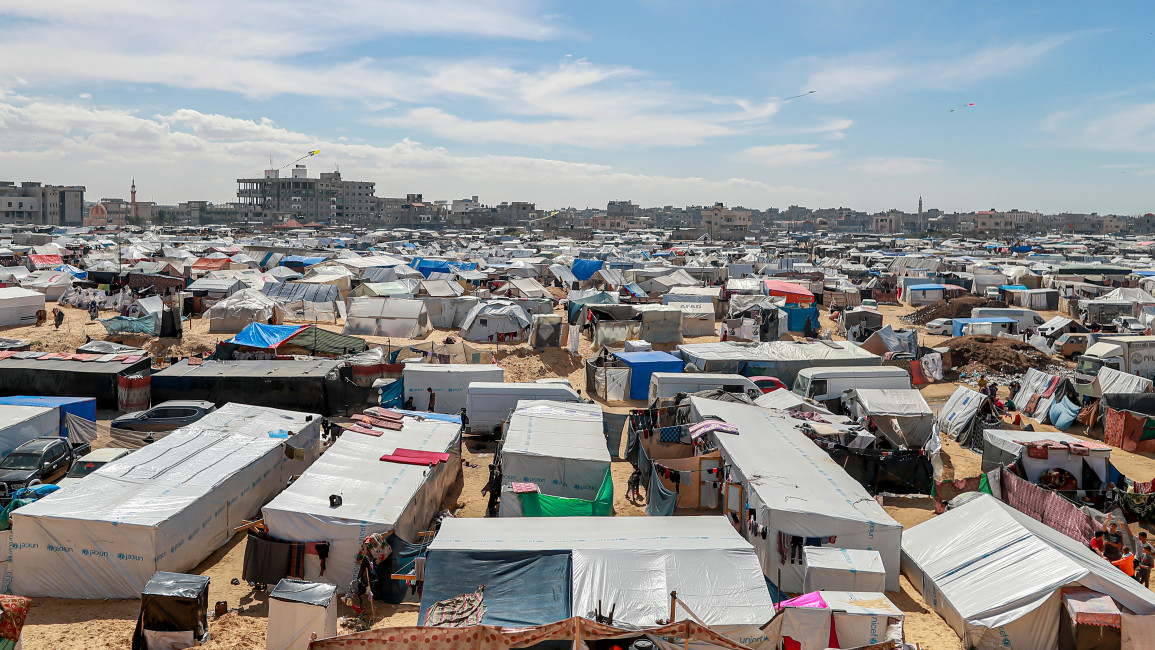Israel presents Gaza 'humanitarian islands' plan to expel Palestinians ahead of Rafah invasion
The US has reportedly given Israel the green light to invade Rafah following the announcement of plans to move the thousands of Palestinians sheltering there to so-called "humanitarian islands" in the centre of war-ravaged Gaza.
Daniel Hagari, the Israeli army spokesperson, on Wednesday announced plans to relocate large numbers of people from the southern city of Rafah, where over one million people have sought safety, to the "humanitarian enclaves" in central Gaza.
Hagari said that the plan is in coordination with Egypt, which shares the southern border with Gaza, but did not reveal when the anticipated invasion will begin.
He said Palestinians there would be provided shelter, food and water, which comes amid growing global anger over Israel's siege on Gaza which has led to starvation in the north.
"We need to ensure that 1.4 million people, or at least a significant part, will move," Hagari said.
"Where? To humanitarian islands that we will create with the international community."
Hagari’s announcement follows a report in American publication Politico which revealed the US was tentatively giving Israeli Prime Minister Benjamin Netanyahu the green light to conduct an offensive in Gaza, despite Biden previously asserting that an invasion would be a 'red line'.
Washington, Israel’s closest ally, had maintained that Netanyahu must present a "credible" plan for the safety of civilians in Rafah ahead of an invasion. Despite international concern, the Israeli premier has insisted the incursion must go ahead in line with his war objective to dismantle Hamas.
But US National Security Advisor Jake Sullivan earlier this week denied that Biden had issued a red line on future Israeli actions during an interview with MSNBC.
The "humanitarian island" plan is the latest directive in what has been a series of US and Israeli demands for civilians to make way for an Israeli assault.
Throughout the five-month war, the army has issued repeated and conflicting instructions forcing Palestinians to relocate.
Most of those in Rafah are from towns in the north and have been displaced several times, have little belongings and are dependent on daily handouts.
In 2005, the UN endorsed the ‘Responsibility to Protect’ doctrine, a commitment to make sure the world never again fails to halt mass atrocity crimes – such as genocide and other crimes against humanity. Yet these are the kinds of crimes Israel has been committing every single… pic.twitter.com/du0Z2l1dgJ
— The New Arab (@The_NewArab) March 12, 2024
Humanitarian agencies have rejected over the safety of Hagari’s plan – of which details are yet to be revealed – but entail the potential movement of more than a million people across a war zone.
Nicola Banks, lead advocacy at UK-registered charity Action For Humanity, described it as a worrying development and expressed serious doubt on the viability of the plan.
"First there were 'humanitarian corridors', then there were 'safe zones', then 'sensitive sites' and now 'humanitarian islands'," she said to The New Arab.
"Over the last five months, we have seen areas designated as ‘safe’ be targeted and bombarded," Banks said, adding that Action For Humanity's staff in Gaza have witnessed increasing assaults on Rafah, a supposed 'safe zone', in recent weeks.
"The central area of the strip, designated for 'humanitarian islands', is already significantly damaged due to airstrikes - the north and centre are particularly lacking sufficient medical facilities to handle a considerable influx of displaced people," she said.
Banks said that Action For Humanity, alongside other aid groups, are urging the UK government to intervene in Israel's planned invasion of Rafah, which Netanyahu approved on Friday.
Evacuating citizens from Rafah and the surrounding area is almost the equivalent of evacuating the population of Birmingham.
Rafah and Al-Mawassi area near the coast have been transformed into a 'city of tents', sheltering thousands of families and a relocation would be a mammoth task.
Palestinians in Gaza have said they do not believe anywhere to be immune from Israeli attacks. Over 31,000 Palestinians have been killed and over 70,000 injured in the past five months.
There are also numerous accounts of UN and aid related infrastructure being hit by Israeli shelling, despite location coordinates being shared and cleared with the military.
On Wednesday, NGOs Medical Aid for Palestinians and International Rescue Committee said they had received six different explanations from the Israeli military as to why their building housing aid workers in Al Mawassi – designated a safe zone - was hit by a strike on 19 January.
Rafah has become the humanitarian centre and storage point for supplies arriving through the border, and agencies have warned that an invasion could severely disrupt operations.
The majority of Gaza's population has been displaced by the war and over a quarter are facing famine-like conditions from prolonged blocking of aid into the territory and the destruction of Gaza's agriculture.
European Union chief Josep Borrell described the situation as a "man-made" disaster in comments this week.
"[The humanitarian crisis is] manmade and when we look for alternative ways of providing support by sea, by air, we have to remind [ourselves] that we have to do it because the natural way of providing support through roads is being... artificially closed.
"Starvation is being used as a war arm and when we condemned this happening in Ukraine, we have to use the same words for what is happening in Gaza," Borrell told the UN Security Council in New York on Tuesday.
Editor's note: This story has been updated to include comments from Action For Humanity



